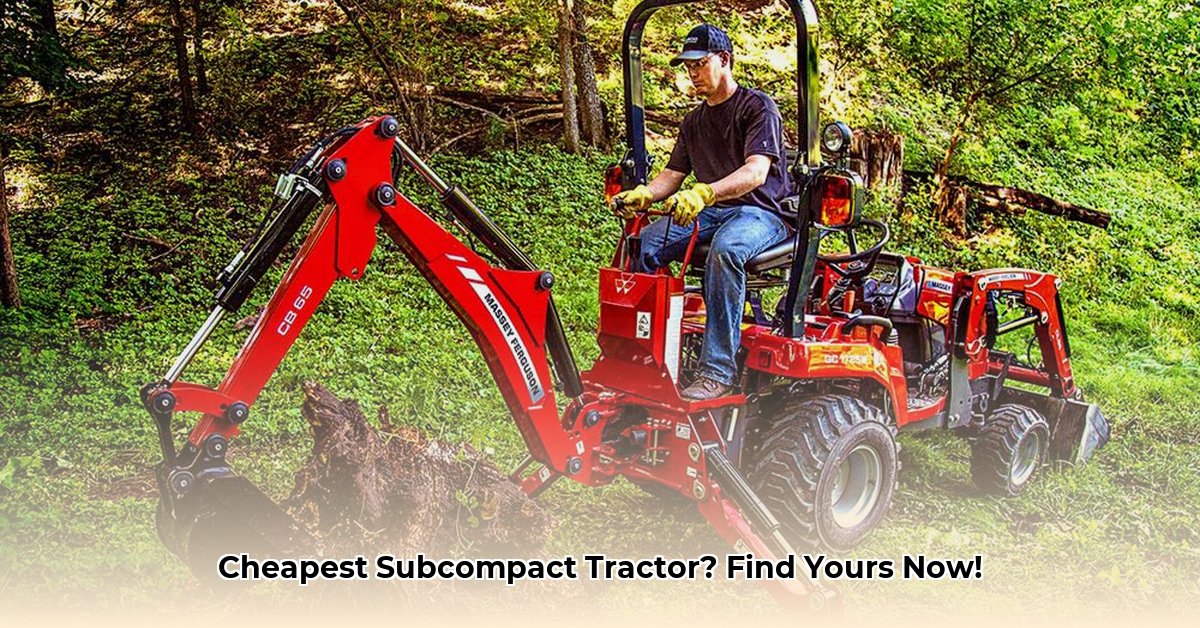
Finding the right subcompact tractor without breaking the bank requires careful planning and research. This guide provides a comprehensive overview of the market, helping you find the most affordable option that meets your needs. For more information on New Holland compact tractors, check out their website: New Holland Tractors.
Sizing Up Your Needs: Prioritizing Your Requirements
Before comparing prices, define your needs. What tasks will your tractor perform? Mowing a small lawn? Tilling a garden? Hauling light materials? The size of your property directly impacts the tractor's required power and features. A smaller yard might necessitate a less powerful, and cheaper, model, while larger properties require more robust (and expensive) machinery. Create a detailed list of your requirements – this is crucial for budget-conscious shopping.
Key Features: Maximizing Value, Minimizing Cost
Horsepower (HP) directly affects a tractor's capabilities. While more horsepower means tackling tougher jobs, it also increases the price. Honestly assess your workload. Do you really need the additional power, or will a lower-horsepower tractor suffice? This decision directly impacts your budget. Equally important is lift capacity – the weight the tractor can lift. Consider the weight of the implements (attachments like mowers or tillers) you'll use. Ensure the tractor's lift capacity comfortably handles the combined weight to avoid frustration. Don't overspend on features you won't use.
Comparing Brands and Prices: A Market Overview
The following table provides estimated price ranges. Remember, these are approximations; actual prices vary by location, dealer, and model year. Use this as a starting point for your research.
| Brand | Example Models | Approximate Price Range (USD) | Typical HP Range | Typical Lift Capacity (lbs) |
|---|---|---|---|---|
| John Deere | 1025R, 2025R | $18,000 - $28,000 | 25-30 | 1,000 - 1,500 |
| Kubota | BX23S, BX2680 | $15,000 - $25,000 | 23-26 | 800 - 1,200 |
| Mahindra | 1526 HST, 2526 HST | $12,000 - $22,000 | 25-26 | 900 - 1,400 |
| New Holland | Boomer 20, Boomer 30 | $17,000 - $27,000 | 20-30 | 800 - 1,500 |
| Massey Ferguson | 1526, 1726 | $16,000 - $26,000 | 26-26 | 1000 - 1500 |
Important: Prices are estimates and subject to change. Verify with local dealers for current pricing.
Your Step-by-Step Guide to Affordable Tractor Ownership
Define Your Needs: List all tasks, acreage, and budget limitations. Be realistic about your requirements. Don't overspend on features you won't use.
Set a Realistic Budget: Determine your maximum spending limit, including potential maintenance costs. This is crucial for avoiding overspending.
Research Different Models: Explore online resources, dealer websites, and independent reviews. Pay close attention to specifications and compare features across brands.
Analyze Reviews: Consider user feedback. Look for patterns in reviews—are there recurring issues with specific models? This can save you from potential headaches.
Visit Dealerships (If Possible): Test drive tractors to get a feel for their handling and comfort. This hands-on experience makes a big difference.
Negotiate the Price: Don't hesitate to negotiate, especially during slower sales periods. Dealers often have flexibility on pricing.
Finalize Your Purchase: Once satisfied with the tractor and price, carefully review all paperwork before signing.
Used Tractors: A Cost-Effective Option
Consider buying a used tractor. A well-maintained used tractor can significantly reduce your upfront costs. However, carefully inspect any used equipment. Check its maintenance history, operating hours, and overall condition. If you lack mechanical expertise, a pre-purchase inspection by a qualified mechanic is recommended. A thorough inspection could save you significant repair costs down the line.
Key Takeaways: Making an Informed Decision
- Prioritize needs: Define tasks and acreage before model selection. This will focus your search on appropriate machines.
- Balance power and cost: Consider horsepower and lift capacity against your budget. Don't overbuy!
- Evaluate used tractors: Used tractors offer significant savings, but require careful inspection.
- Research thoroughly: Compare brands, models, and features to find the best value.
- Test drive (if possible): This hands-on experience helps gauge handling and comfort before committing to a purchase.
By following these steps, you can confidently navigate the subcompact tractor market and find the cheapest option that perfectly suits your needs. Happy tractor hunting!